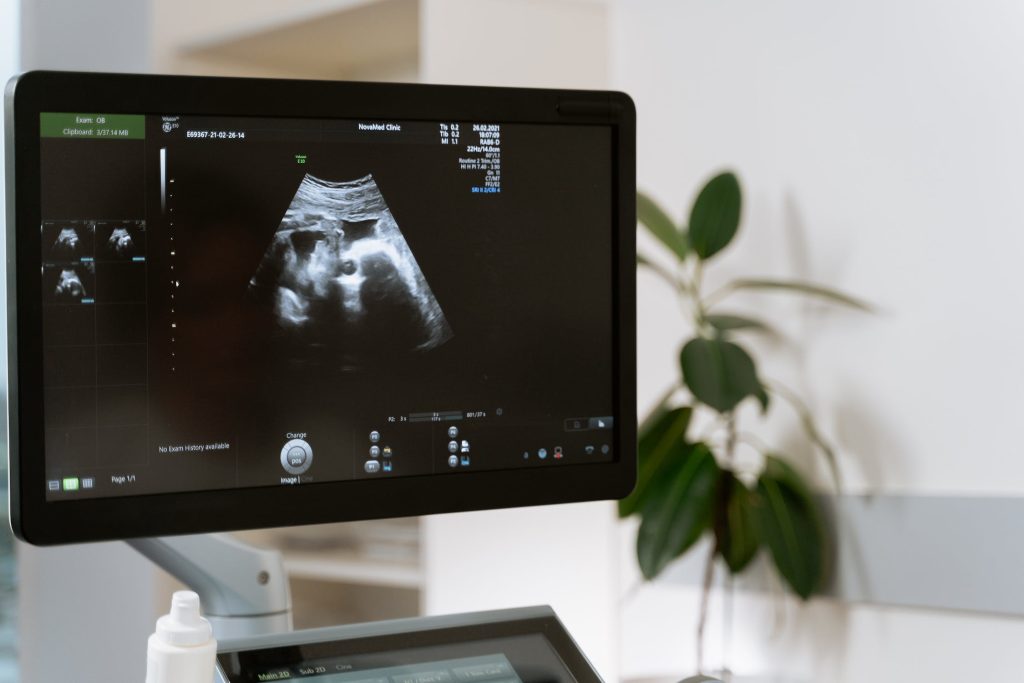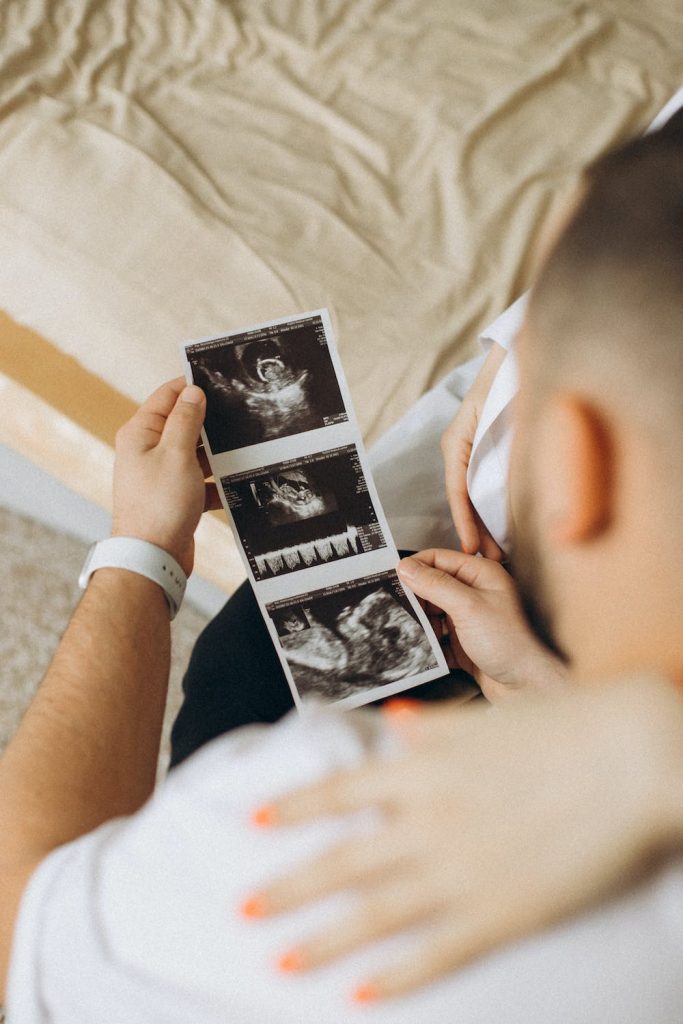You’re about to experience a miracle! At six weeks into your pregnancy, you’re gearing up for your first ultrasound. This isn’t just a doctor’s appointment, it’s your first glimpse of your little baby. There’s excitement, maybe some nerves. What will you see? What should you expect?
Don’t worry, we’ve got you covered. This guide will walk you through the ins and outs of a 6-week pregnancy ultrasound, ensuring you’re well-prepared for this extraordinary moment.
Reasons for a 6 Week Ultrasound
There are several reasons why you might need a 6-week ultrasound.
If you’ve had complications or losses in previous pregnancies, this early scan can provide reassuring news of a heartbeat or an indication of potential problems.
It’s crucial if you’re unsure about the date of your last period or have an irregular menstrual cycle, as it helps establish an accurate due date.
It’s also used if there’s any bleeding, to check the pregnancy isn’t ectopic.
This scan can identify whether it’s a multiple pregnancy, which is crucial for planning appropriate care.
If you’re of advanced maternal age or have certain medical conditions, this ultrasound can provide early insights.
It’s not just about spotting potential problems, but also about confirming the happy news that your pregnancy is progressing as it should.
What to Expect During Your Ultrasound
While you might feel a bit anxious about your ultrasound, it’s important to know what to expect during this crucial scan.
First, you’ll be asked to lie on a bed and the technician will apply a special gel to your abdomen. This gel helps the ultrasound probe slide easily and improves the quality of the sound waves.
The technician will then move the probe back and forth across your belly to capture images of your baby. You might feel a slight pressure, but it shouldn’t hurt.
The whole procedure usually takes about 20-30 minutes. During this time, you’ll see images of your baby on the monitor.
Understanding Your Baby at 6 Weeks
At six weeks into your pregnancy, you’re likely curious about what’s happening with your baby’s development. Although tiny, your little one is growing rapidly. Here are some key developments:
- Size: Your baby is about the size of a lentil, measuring approximately 5-9mm long.
- Heartbeat: The heart starts to form and may begin to beat, although it might be too early to detect during an ultrasound.
- Organ Development: The neural tube, which becomes the brain and spinal cord, begins to form, along with the baby’s early structure.
Examining Ultrasound Risks and Safety
You might have a few concerns about the safety and potential risks of a 6-week pregnancy ultrasound. It’s important to know that ultrasounds are generally safe for you and your baby. They use sound waves, not radiation, to create images.
However, the use of Doppler ultrasound, which is often used to measure blood flow, should be minimized in your first trimester. The brief moments of Doppler usage are unlikely to cause any problems, but it’s always best to limit exposure when possible.
Rest assured that healthcare professionals follow strict guidelines to ensure the safety of these procedures. If you still have concerns, don’t hesitate to discuss them with your healthcare provider. They can provide further reassurances and address any specific worries you may have.
Interpreting 6-Week Ultrasound Results
Interpreting your 6-week ultrasound results, it’s essential to understand what the sonographer is looking for and what the images represent. This ultrasound is a milestone in your pregnancy journey, providing the first glimpse of your developing baby.
- Gestational Sac: This small, dark circle is your baby’s first home. It should be round and located within the uterus. If it’s not, it might indicate an ectopic pregnancy.
- Yolk Sac: This small white circle nourishes your baby before the placenta takes over. It’s a positive sign of a healthy pregnancy.
- Embryo and Fetal Heartbeat: At this stage, your baby, also called an embryo, might be visible. The detection of a heartbeat is a promising sign, but it mightn’t always be visible this early.
If there’s any doubt, your healthcare provider will recommend a follow-up scan.
Preparing for Follow-Up Ultrasounds
While it’s exhilarating to see your baby for the first time in a 6-week ultrasound, you’ll need to prepare for future follow-up ultrasounds as well. These scans provide valuable insights into your baby’s development and help monitor your health throughout the pregnancy.
Before each ultrasound, hydrating well as a full bladder can aid in getting clearer images. Wear comfortable clothing for ease during the procedure. Remember, you can ask questions and discuss any concerns with the sonographer before the scan starts.
It’s normal for follow-up scans to be more detailed, which might increase the duration of the procedure. Finally, be patient. Sometimes, the baby’s position may require you to move or come back later for a clearer image.
Frequently Asked Questions
What Preparations Are Necessary Before Undergoing a 6-Week Pregnancy Ultrasound?
Before a 6-week ultrasound, you’ll need to drink plenty of water to ensure a full bladder, which improves image clarity. Wear comfy clothes for easy access to your abdomen. Don’t stress, it’s a routine procedure.
What Are the Main Differences Between a Transvaginal and an Abdominal Ultrasound at 6 Weeks of Pregnancy?
In a transvaginal ultrasound, you’ll have a probe inserted into your vagina for clearer images. An abdominal ultrasound, however, uses a probe on your belly’s surface. Both methods provide valuable information about your pregnancy.
How Accurate Are the Results of a 6-Week Pregnancy Ultrasound?
Like a compass in uncharted territory, a 6-week ultrasound provides guidance but isn’t always 100% accurate. It’s often too early to see everything clearly, so don’t fret if all the details aren’t visible yet.
Are There Any Specific Signs or Symptoms That May Require a Woman to Have an Ultrasound at 6 Weeks?
If you’re experiencing unusual symptoms like severe pain, and spotting, or have a history of pregnancy complications, you might need a 6-week ultrasound. It’s best to consult with your healthcare provider to decide.
What Alternatives to Ultrasound Are Available for Early Pregnancy Monitoring and Diagnosis?
Alternatives to ultrasound for early pregnancy monitoring include blood tests to check hormone levels, physical exams by your healthcare provider, and self-monitoring of pregnancy symptoms. Always consult your doctor for tailored advice.
Conclusion
As you embark on this thrilling journey of motherhood, remember that the 6-week ultrasound isn’t just a medical procedure; it’s your first meeting with your little baby.
It might seem daunting, but knowing what to expect can make it an incredibly joyful experience. So, breathe deep, feel the coincidence of your heartbeats, and cherish this moment.
You’re not just expecting, you’re growing, nurturing, and loving.
This is just the beginning of a beautiful journey, and you’re doing wonderfully!
Reference:
https://www.healthline.com/health/pregnancy/6-week-ultrasound
https://www.iuslondon.co.uk/pregnancy-news/6-week-pregnancy-scan/
https://www.huggies.com.au/pregnancy/stages-of-pregnancy/6-week

